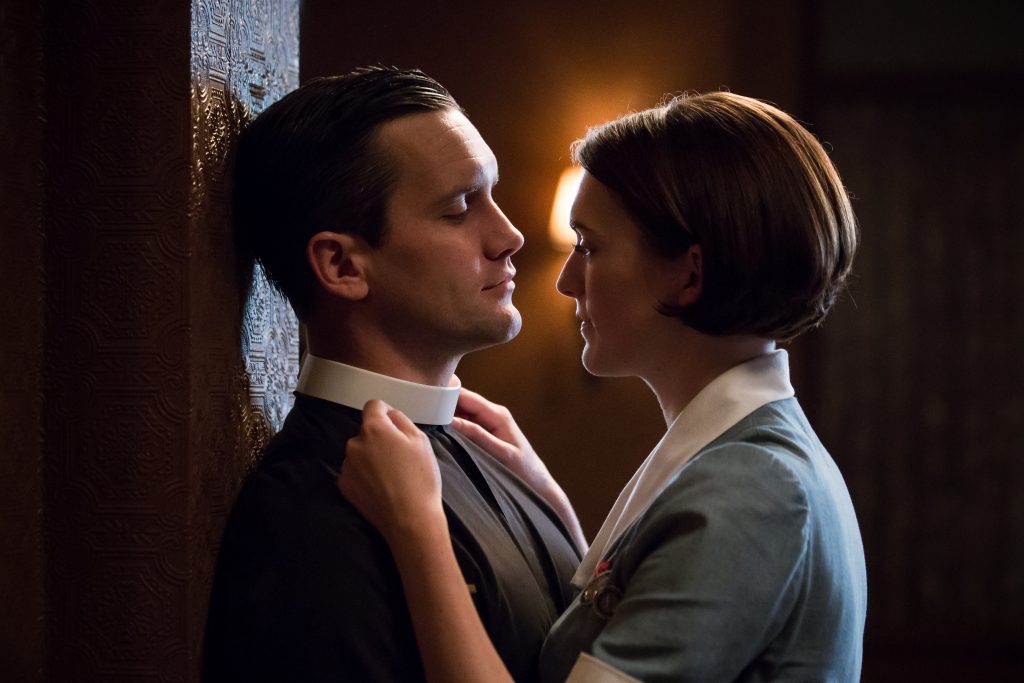Call the Midwife is back for a fifth season and so are the faculty of the Vanderbilt University School of Nursing with a weekly guest blog. Watch the show 7 p.m. Sundays through May 22, then read the blog each Monday morning for historical and contemporary context about the previous night’s episode. SPOILER ALERT: Some posts may contain spoilers.

By Michelle Collins
Vanderbilt University School of Nursing
 This season’s Call the Midwife episodes have included no shortage of controversial topics, at least what was considered controversial in the late 1950s. This most recent episode was no exception with its focus on various aspects of sexuality, namely the sexual tension between the Rev. Tom Hereward (Jack Ashton) and midwife Barbara Gilbert (Charlotte Ritchie); the hidden romance between midwife Patsy Mount (Emerald Fennell) and female partner Nurse Delia (Kate Lamb); and the advent of hormonal contraception – the introduction of “the pill” into British society.
This season’s Call the Midwife episodes have included no shortage of controversial topics, at least what was considered controversial in the late 1950s. This most recent episode was no exception with its focus on various aspects of sexuality, namely the sexual tension between the Rev. Tom Hereward (Jack Ashton) and midwife Barbara Gilbert (Charlotte Ritchie); the hidden romance between midwife Patsy Mount (Emerald Fennell) and female partner Nurse Delia (Kate Lamb); and the advent of hormonal contraception – the introduction of “the pill” into British society.
Let’s just walk down memory lane a bit on the topic of contraception…
Ancient Egyptian women used a variety of substances to prevent pregnancy, among them honey and crocodile dung inserted vaginally (perhaps it was merely the odor of crocodile dung that kept suitors away!). Casanova has the historical reputation as a great lover, but having many lovers comes with the caveat of siring many children unless one is savvy in preventing conception. Casanova was noted to have hollowed out lemon halves and placed them inside his lovers’ vaginas, over the cervix, to act as a rudimentary diaphragm. The contraceptive pill was approved by the FDA in 1960 for use as a contraceptive agent, although many women were already using it for “non-contraceptive reasons”.¹
Sister Julienne (Jenny Agutter) though deeply devout, is also practically minded and empathizes with the women she serves who inarguably have no control over their own fertility. To Dr. Turner’s (Max Macmillan) reference to the pill as a miracle, however, she replies that is “it’s a miracle with moral implications.” For her, the idea that sex for any purpose other than procreation could not only be discussed, but sanctioned, was heresy. The arrival of the pill helped usher in the sexual revolution of the 1960s and afforded women a never before realized “freedom” to explore sexual relationships beyond the boundaries of the marital “contract.”
The march of progress is always a wonderful thing, right? One has to consider, though, whether the paradigm of “sexual freedom” has served women well in every aspect of our lives. The value of women being able to have charge of their own fertility is indisputable. The value of the current societal “norm” of “hooking up,” though, wherein casual sex comes without any commitment, is perhaps not so beneficial if we look at the research. From a purely biologic perspective, a woman’s body releases a hormone called oxytocin when she has a sexual experience (the same hormone a woman releases when in labor, actually). The release of this hormone, in the most basic of descriptions, causes some degree of bonding of the woman to her partner.
Current research has noted that women who have multiple random sexual experiences with “no strings attached” have an increased incidence of depression and anxiety (purportedly due in part to lack of physiologic bonding). College-aged women, in particular, who engage in casual sexual encounters report lower levels of self-esteem and satisfaction with their lives as well as lowered levels of happiness when compared to women who do not engage in these behaviors. 2,3 Recent research even notes higher rates of marital infidelity for millennials who marry after spending time in the hook-up scene. Though many things could purport to explain higher infidelity rates among this group, one cannot help but wonder whether having numerous casual sexual experiences devoid of any emotional connection has a causal relationship. That old adage “freedom isn’t free” comes to mind.
- A Brief History of Birth Control May 3, 2010. Time http://content.time.com/time/magazine/article/0,9171,1983970,00.html
- Garcia JR, Reiber C, Massey SG, Merriwether AM. Sexual Hookup Culture: A Review. Review of general psychology : journal of Division 1, of the American Psychological Association. 2012;16(2):161-176. doi:10.1037/a0027911.
- Garcia, J., The Kinsey Institute for Research in Sex, Gender, and Reproduction, Reiber, C., Massey, S., and. Merriwether, A. Sexual hook-up culture, American Psychological Association. February 2013, Vol 44, No. 2.
Michelle Collins Ph.D., CNM, FACNM is a professor of nursing and director of the Nurse-Midwifery Program, at Vanderbilt University School of Nursing.